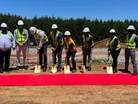Eskom begins construction on South African BESS project

Eskom, the South African electricity public utility, has announced that construction has begun on the Eskom Battery Energy Storage System (BESS) project – the first energy storage facility under the company’s flagship BESS project.
In a statement, the company said that a sod-turning ceremony was held at the Elandskop BESS site which is located within Msunduzi and Impendle Local Municipalities in KwaZulu-Natal. Hyosung Heavy Industries, one of the appointed service providers for the project, also participated in the ceremony.
Construction will take between seven and twelve months and the batteries on the site will be charged from the main grid via Eskom’s Elandskop substation, the company said. It added that the facility will have a capacity of 8MW, equivalent to 32MWh of distributed electricity, enough to power a town such as Howick (population 21,639) for four hours.
Among the notable benefits of the BESS is that it will boost the network during peak hours, thereby reducing the strain on the network, the statement pointed out.
“The beginning of the construction of the Elandskop BESS is a positive development in our efforts to alleviate the pressure on the national electricity grid,” said André de Ruyter, Eskom Group Chief Executive, speaking at the event.
“This is a direct response to the urgent need to address South Africa’s long-running electricity crisis by adding more generation capacity, to the grid, and also to strengthen the grid by adding more storage and transforming capacity.”
Elandskop is part of Phase One of Eskom’s BESS project, which includes the installation of approximately 199MW additional capacity, with 833MWh storage of distributed battery storage plants at eight Eskom Distribution substation sites throughout the country.
This phase also includes about 2MW of solar photovoltaic (PV) capacity.
Record-breaking Project
The cost of the project will be approximately ZAR11 billion and is being funded through concessional loans from the World Bank, African Development Bank and the New Development Bank. The procurement process for this project has been set out by funders and Eskom is in compliance with it and internal governance, the company asserted.
Phase Two of the project includes the installation of a further 144MW of storage capacity, equivalent to 616MWh at four Eskom Distribution sites and one Transmission site. The solar PV capacity in this phase will be 58MW.
The BESS project will utilise large scale utility batteries with the capacity of 1 440MWh per day and a 60MW PV capacity. It will be one of the largest BESS projects to be developed and implemented in South Africa.
“Eskom has identified distributed storage as an alternative to support renewable energy expansion in South Africa and we have taken the necessary steps to ensure the successful implementation of the BESS project,” said Velaphi Ntuli, Eskom’s General Manager – Distribution, Operations Enablement.
All Phase One sites are planned to be commissioned by 30 June 2023 and Phase Two by December 2024.
- How Industrial Power Connectors Boost Site SafetyConstruction Projects
- IFS and Anthropic: An AI Alliance For Heavy IndustryTechnology & AI
- Currie & Brown: How Global Volatility Hits ConstructionConstruction Projects
- Gensler Leveraging Climate Tech for Built EnvironmentSustainability & Green Building



